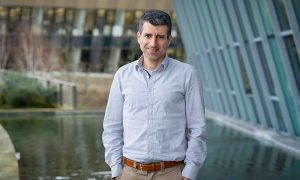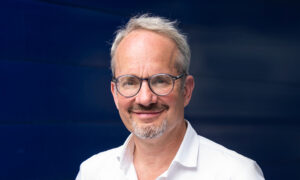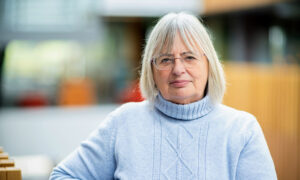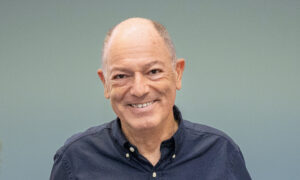
Courage to succeed: EMBL Women’s Night 2019
Championing the talent of women as they advance towards leadership in science
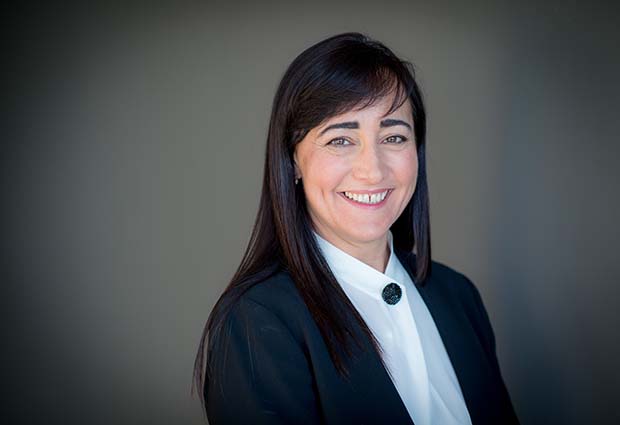
EMBL Women’s Night provides an opportunity for women from academia, business and politics to connect and share ideas. This year, the event marks the launch of a mentoring programme for the advancement of women in science, which is supported by donations from the Friends of EMBL.
Teresa Rodó, Head of Global Healthcare Operations at Merck Group, will be among the speakers at the event, which takes place at EMBL Heidelberg on 14 November. Here, she shares some insights gained from a successful career in the pharmaceutical industry.
Briefly describe your current role.
Let me start with a few words about our company. Merck is a vibrant science and technology company, and science is really at the heart of everything we do. Our work has an impact on millions of people’s lives, not only through the healthcare business sector, which is my area, but also through the life science and performance materials business sectors. I’m Head of Global Healthcare Operations – a team of almost 7000 people – and we’re responsible for the development, manufacture, supply and quality of all Merck’s biotech and pharmaceutical medicines, as well as for medical devices. We have a network of 18 manufacturing sites around the world and we have teams in over 60 countries, composed of around 80 nationalities. We’re a very diverse workforce, and we’re united by our goals, and also by our pride. We serve as best we can the 75 million people around the world who count on our medicines each and every day.
What made you want to become a scientist?
That started very early on. When I was at school, I was really interested in science and I also had a passion for helping others. I thought I’d become a medical doctor. But then I had a chemistry teacher who really fuelled my passion to understand how things work. That triggered this huge thirst to understand – this curiosity – that I have. It was very obvious to me that science would be my career. When I was at university, I studied chemical engineering, and I specialised with a view to getting into the pharma industry, which is another way to help others. You could say that my school teacher was really my inspiration for all that.
Did your family support your interest in pursuing a career in science?
Yes. My mother was a teacher, and she always nurtured in us a passion for learning. My dad also influenced me in the desire to have an impact. He had a love of languages, and he passed that on to us. So both of them supported me in achieving my aims, and I’m very grateful for that. They both nurtured in me that curiosity, but also tenacity, and the means to connect with others by learning languages. They enabled me to follow my passion and my career.
Were you aware of any gender barriers early in your career, and do you think things have improved in this regard?
Looking back to my early days, growing up in a family of four girls and one boy, I never felt a difference based on gender. My parents never treated us differently. We all learned to work hard for what we wanted. As the oldest of five, I had to lead the way. Once out of my parents’ home, I realised there was discrimination, that the external world was making a difference between genders. At university, studying chemical engineering, I was one of only a few females in my year. Boys were louder, more prominent; they got things done and pushed through. In my career, I’ve had situations where I was the only woman in the room, or where I felt like the token woman. But I think those experiences have been important for me, and I’ve been able to adjust. I’m not a very tall person, but I’ve learned to stand tall. I’ve learned to project my voice. I’ve learned to have the courage to correct others when they overrun me verbally. Many years ago, I made a conscious decision to look to other women as a network, and also to offer my support. It goes in both directions. It’s not about excluding men, but ensuring that we women support each other as well.
As to the question of what has improved, there’s a significant trend of companies evolving in the right direction. We’re all more aware of the value of diversity now, at least within Merck. Promoting and protecting diversity in our workforce is a top priority for all senior management here. For me personally, as Head of Global Healthcare Operations, and the representative of Healthcare in our group-level diversity council, that’s very important. It’s also important to say that the value of diversity can only be leveraged if there’s also inclusion – it’s about providing employees with a workplace where they feel safe and comfortable to be themselves. Ideally, our workforce should be a reflection of society. We’re not there yet. Different types of employees must feel comfortable sharing their perspectives and their views. Everyone’s very focused on gender – and, yes, we have plenty to do there – but diversity goes way beyond gender. We also need to consider nationalities, ethnicities, cultures, generations, and even diversity of thought. Diversity is a consequence of strong leadership. In my opinion, the more diverse perspectives you have when making decisions, or when managing or leading your business, the more solid and rich your decisions will be.
Have you had any important mentors in your career?
I’ve been blessed throughout my career to work with many great leaders who influenced me in one way or another. I’ve always been very open to receiving guidance, and also to being challenged. There was one person in particular who really had an impact on me. Very early on in my career, there was a situation where I felt really small. I was new in the role, the other people were much more senior, and I was the only woman in the room. This person trusted me. He told me, “You have full command of this matter. In spite of the fact that the other people at the table are older than you and have huge experience, you need to speak to them at eye level.” This was a powerful nudge and it made me appear very confident, even though I wasn’t. I think mentoring is very important, because there’s no substitute for the advice of an experienced person. It’s about supporting an individual to make the best of themselves. Mentorship is a two-way street. Now I’m mentoring people as well, and I also have a reverse mentor – a person in our organisation who’s much younger and from a different cultural environment. I’m trying to understand the new generation and their priorities, because they’re the workforce of tomorrow. Mentorship takes a lot of time, but I see great value in it and consider it an investment.
What do you find most rewarding about working in science?
I’ve made my career in the pharma industry, where science directly translates into having a positive impact on people’s lives. I’m very proud to work in this industry. I’m particularly proud to work in a company like Merck, with a strong sense of purpose. We define ourselves as curious minds dedicated to human progress. For us in healthcare, we work as one to help create, improve and prolong life. There’s nothing more compelling than that.
What qualities do you consider to be important in a leader?
Strong leaders believe in themselves, they also believe in others, and they really have a passion for their field of work. In terms of my own leadership style, I lead by example. I’m very results oriented as well as quality driven – that balance is key. I’m also an advocate for diversity. These are things that I value in others as well.
What advice would you give to your younger self?
If I’d been aware of the reasons why it’s more difficult for women to reach impactful positions, I think I could have benefited from that. It would have enabled me to take action sooner, or more effectively, to really build on my strengths. I would advise myself to focus on my leadership purpose, to be clear on my goals, and to really understand who I need to be and what I need to learn in order to achieve those goals. The most important thing I’d tell myself – and it’s the theme of my speech at EMBL Women’s Night – is “Trust yourself.”
